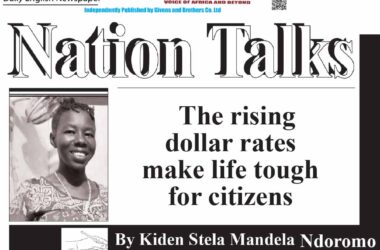By Ustaz Mark Bang
A good leader can put a country on a good path, but no leader can keep the country on that path forever, because eventually, they die. The thing that translates to long-term success is not the individual leaders but having good systems that allow the country to run smoothly no matter who is leading. Good leaders help, but the systems are the key to success.
Governance involves the management and delivery of policies and programs as authorized by an executive or combined legislative-executive effort. Indirectly it can be authorized by a judicial ruling, as in a court-ordered desegregation, and monitored by that court, but it still has to be put into place/enacted by an agent of the executive and/or judicial branch.
It’s bad governance when responsible agents—usually bureaucrats—fail to enact the policy or program intent, thereby subverting intended purposes or goals or overturning prior practice without higher authorization. Failing to enforce a zero tolerance drug policy or doing so on a case by case basis would be an example of bad governance. I can easily imagine illustrations higher up the chain, but I don’t want to start a political debate. If an authoritarian dictator gets better results than a democratically elected president, then would it be better to have a dictatorship than a democracy? Actually, yes. For that term.
If a leader is better, then he’s better. How the leader got to power makes no real difference with regard to the talent the person has once in power. If he inherited it, took it by force, or was elected, any of those methods can produce someone with a good ability to lead. The question is: What about next term? Say you get a good dictator. Maybe he rules for 30 years, and that is a golden age for your country. That’s great. But, will his successor be as good? What about the one after that? Is there a formal succession in place, or does a civil war break out every time a dictator dies?
Countries outlast people. Countries work on time spans of hundreds, sometimes thousands, of years. For a country, any individual leader, no matter how good, is an eyeblink.
Democracy, for the last two centuries, has been the most effective system humanity has ever seen of getting a succession of decent leaders and limiting the excesses of power when bad ones get in. A representative democracy with separation of powers moves glacially slowly, and in general that has been a very good thing. It does limit the effectiveness of truly great visionary leaders when they get in, but countries generally have more to lose from rash decision-making than they have to gain from visionary change.
I’m not a totally gung-ho “Democracy is the best, rah rah!” type of person. I think we should have open minds; there are flaws with democracy, especially in the social media age. Democracies are fragile and unstable when factions within the democracy become caught in rage-inducing echo chambers or fall prey to propaganda machines that skew people’s understanding of reality. The safety features that prevent the excesses of foolish leaders can be misused by representative bodies not acting in good faith to hamstring progress for the sake of political advantage. It is not all roses for democracy. But, that said, it is hard to argue with results. For two centuries, stable democracies with free elections have produced more peace and prosperity than the world has ever seen. Maybe that era is coming to an end, with the way that public consumption of information has changed; maybe we can do better. But I haven’t heard what “better” looks like yet. Good governance gets the trash picked up and handles health care, education, and a hundred other things at a fair tax rate. Bad governance flubs these duties, taxes unfairly, or both. Sure, good governance inspires trust among the people, even pride, and encourages their public-spirited involvement. However, these follow from good governance.
I think it’s pretty simple. The government is charged with doing things that individuals can’t do on their own voluntarily. Good governance does these things well and fairly. Good governance has 8 major characteristics. It is participatory, consensus-oriented, accountable, transparent, responsive, effective and efficient, equitable and inclusive, and follows the rule of law. It assures that corruption is minimized, the views of minorities are taken into account, and that the voices of the most vulnerable in society are heard in decision-making. Bad governance is the decline in institutional integrity and capacity, aggravated by arbitrary actions and further compromised by a conflict of interests. Political interference and patronage appointments systematically reduce the public sector’s institutional autonomy and integrity. Under such politicization, informal and nontransparent systems for public sector management can increasingly come to dominate established procedures, greatly undermining both the accountability processes and the technocratic capacity in the public service. “Public Staunchest Ally”
The writer of this article is a human rights activist, writer, and professional teacher.




